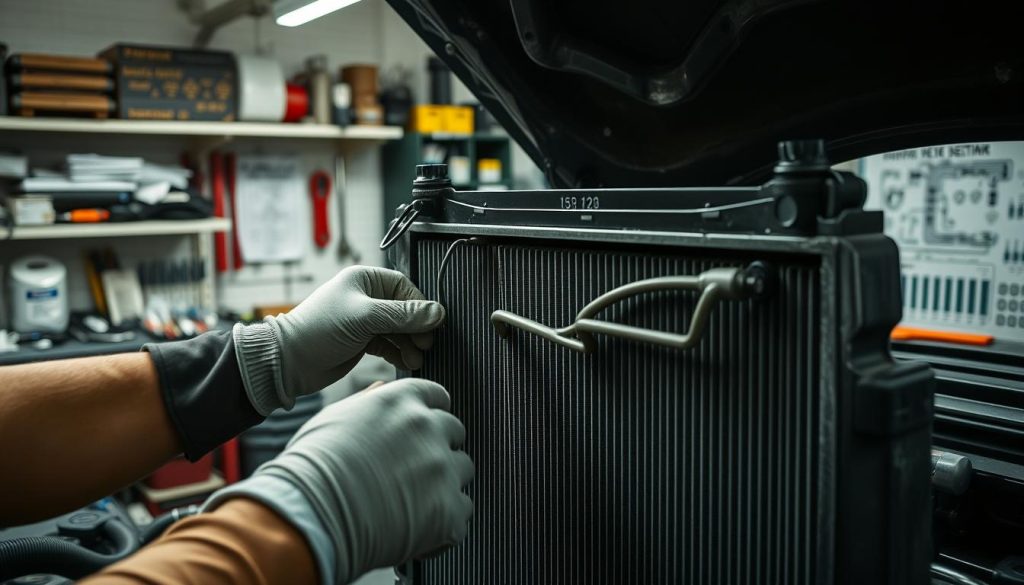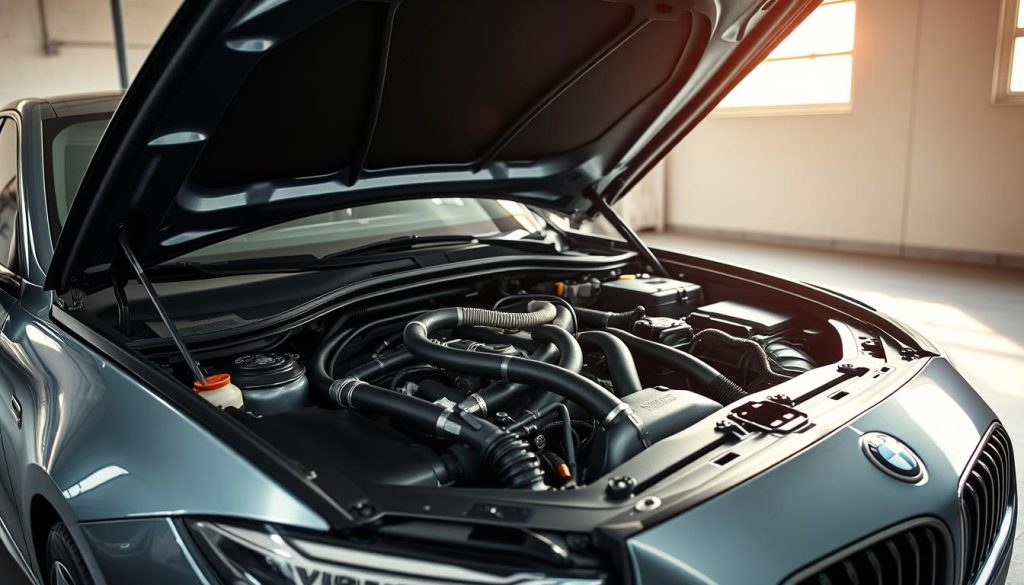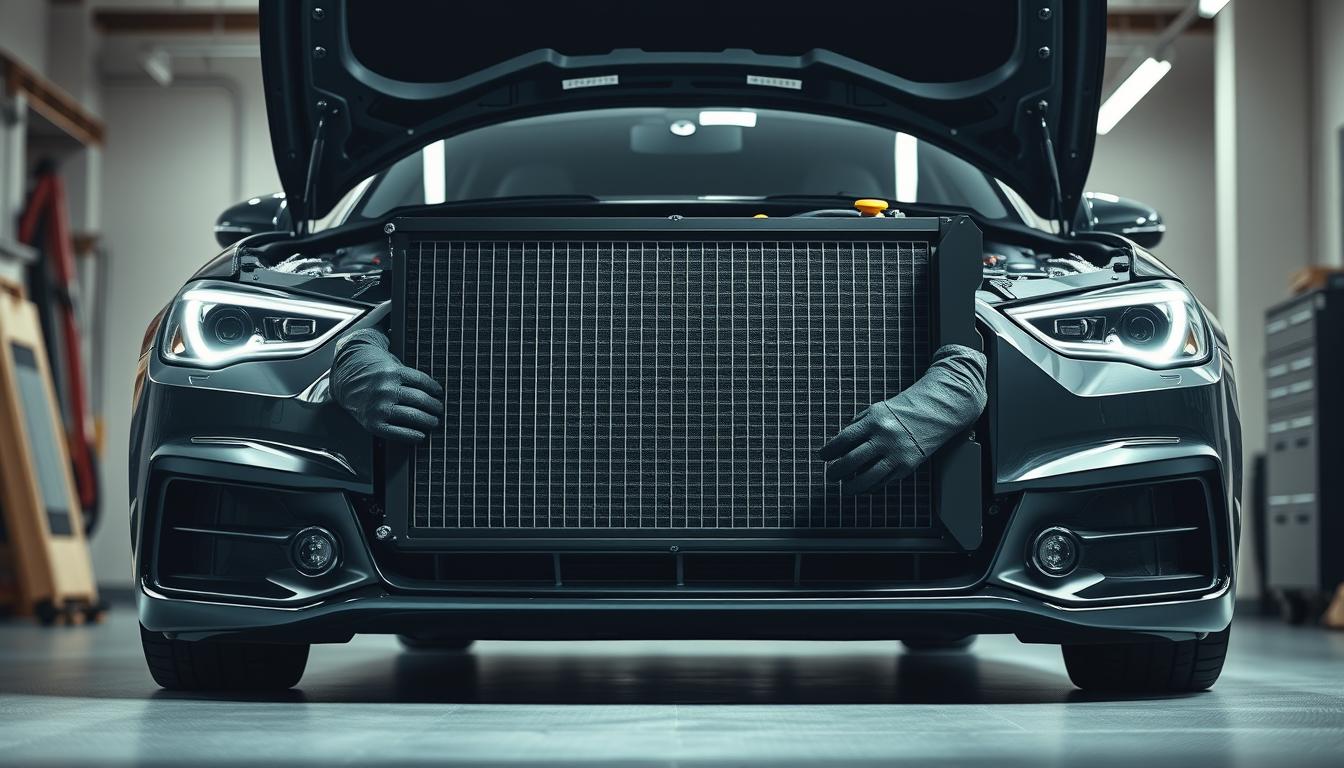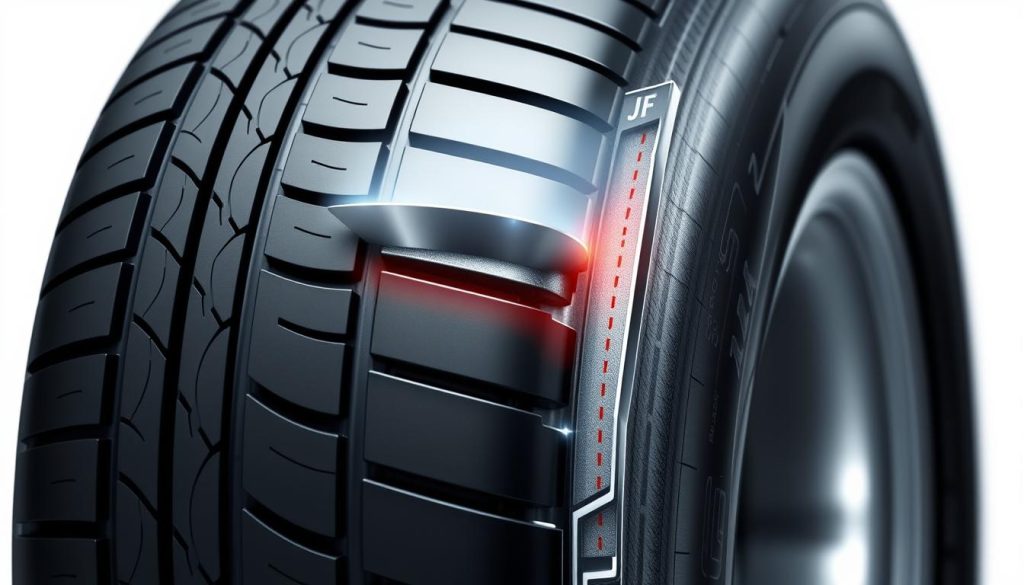Your vehicle’s cooling system works tirelessly to protect its heart – the engine. Over years of use, contaminants build up in the coolant, reducing its ability to regulate temperatures. This creates a hidden threat that could lead to overheating, corrosion, or even complete engine failure.
Modern cars demand more from their cooling systems than ever before. High-performance engines generate intense heat during daily drives, highway commutes, and stop-and-go traffic. Without proper maintenance, old coolant loses its protective properties, putting critical components at risk.
Think of a radiator flush as a reset button for your vehicle. This service removes sludge and debris while replenishing fresh coolant. The result? Improved heat transfer, better fuel efficiency, and consistent performance in all seasons. Many drivers don’t realize how this simple procedure can add years to their engine’s lifespan.
At Heaven Automotive, we’ve seen firsthand how regular cooling system care prevents costly repairs. Let our certified technicians help you avoid emergency breakdowns and keep your car running smoothly for the long haul.
Key Takeaways
- Prevents engine damage caused by overheating and corrosion
- Cost-effective way to maintain peak vehicle performance
- Recommended by technicians as frequently as oil changes
- Extends engine lifespan by removing harmful contaminants
- Requires professional tools and expertise for proper execution
Understanding Radiator Flushes
Maintenance schedules often overlook one critical service that keeps engines running smoothly. Over time, the liquid protecting your vehicle from extreme temperatures degrades, creating hidden risks. Let’s explore how this process works and why precision matters.
What Is This Essential Service?
Automotive experts recommend completely replacing your vehicle’s thermal management fluid every 30,000-50,000 miles. At Heaven Automotive, our technicians use professional-grade equipment to remove contaminated coolant that’s lost its protective properties. This isn’t just draining – it’s a full-system cleanse.
The Science of Temperature Control
Your car’s cooling system relies on a precise mix of chemicals and water. Here’s how our process works:
- Specialized machines push cleaning solutions through engine passages
- Corrosive particles and debris get flushed from hidden areas
- Fresh fluid with updated additives fills the entire network
This method prevents sludge formation better than basic drain-and-fill approaches. Modern vehicles need this thorough treatment to handle stop-and-go traffic and extreme weather. Our team ensures every component receives optimal protection against wear.
Importance of Regular Radiator Maintenance
Vehicle longevity depends heavily on overlooked maintenance tasks. Modern vehicles pack advanced engineering that demands specialized care. At Heaven Automotive, we prioritize preventive measures that shield your investment from internal threats.
Protecting Engine Health
Today’s engines combine aluminum, steel, and other metals in tight spaces. When coolant breaks down, it becomes acidic, attacking these components. Our technicians use pH-testing tools to identify corrosion risks early.

Extending the Lifespan of Your Vehicle
Proper care removes abrasive particles that grind against water pumps and thermostat housings. We replace old fluid with factory-approved formulas containing updated anti-corrosion additives. This approach keeps heat exchange surfaces clean for optimal temperature control.
Regular service intervals prevent minor issues from becoming major repairs. Our clients often see their vehicles surpass 200,000 miles with consistent cooling system attention. Trust our team to implement manufacturer-recommended practices that maximize your car’s potential.
Radiator Flush Benefits
Seasonal temperature swings put immense pressure on your vehicle’s most vital systems. At Heaven Automotive, our precision services combat extreme conditions while boosting efficiency. Discover how modern maintenance solutions keep engines humming through winter’s chill and summer’s heat.
Optimized Power Delivery
Fresh thermal fluids maintain critical anti-freeze properties down to -35°F. This protects against cracked blocks during cold starts while ensuring smooth operation. Our team uses advanced formulas that remove contaminants clogging water pumps and thermostat housings.
Clean systems help engines maintain ideal operating ranges. Consistent heat management reduces wear on moving parts, preserving horsepower and torque output. Many clients report quicker acceleration and smoother idling after our service.
Eliminating Costly Breakdowns
We integrate specialized sealants during fluid replacement to address micro-leaks in gaskets and hoses. This proactive approach prevents sudden failures that strand drivers in dangerous conditions. Our technicians also inspect hoses and connections for early signs of wear.
Enhanced heat transfer capabilities reduce strain on fans and pumps. Vehicles with updated thermal protection often see 3-5% fuel efficiency gains. Regular care at Heaven Automotive helps drivers avoid repair bills averaging $1,200 for overheating-related damages.
Signs Your Car Needs a Radiator Flush
Modern engines give clear signals when maintenance is overdue. Recognizing these warnings early can prevent expensive repairs and keep your vehicle running smoothly. Our technicians at Heaven Automotive specialize in identifying these critical issues before they escalate.

Temperature Spikes and Visible Contaminants
Dashboard temperature gauges creeping into the red zone signal immediate trouble. This often stems from debris blocking narrow cooling passages or sludge buildup restricting fluid flow. We frequently find engines with dark, gritty coolant that’s lost its protective properties.
Sticky deposits form when neglected fluids break down chemically. These gunky residues cling to water pump blades and thermostat housings, creating hotspots. Our pressure-flush systems blast away these contaminants, restoring proper heat exchange.
Mysterious Leaks and Strange Smells
Frequent low coolant levels often point to hidden leaks in hoses or gaskets. We use UV dye tests to pinpoint exact failure locations. Sweet, syrupy odors near the engine bay indicate boiling fluid – a clear cry for help from your cooling system.
Brownish liquid in the overflow tank suggests severe corrosion from acidic old coolant. Our team replaces degraded fluids with manufacturer-approved formulas containing fresh rust inhibitors. Don’t ignore these signs – schedule an inspection before summer heat tests your vehicle’s limits.
When to Schedule Your Radiator Flush
Timing matters more than most drivers realize. Manufacturers design vehicles with specific maintenance rhythms that align with component wear patterns. At Heaven Automotive, we decode these schedules to create personalized care plans for every vehicle.
Follow the Factory Blueprint
Your owner’s manual holds the key. Many automakers suggest servicing the cooling system every 3-5 years or 50,000-100,000 miles. Heavy-duty trucks and performance cars often need more frequent attention. We cross-reference your vehicle’s age, mileage, and service history to pinpoint ideal intervals.
Climate and Commute Factors
Phoenix summers and Minnesota winters demand different strategies. Stop-and-go traffic strains cooling systems more than highway cruising. Our technicians recommend earlier service if you:
- Regularly tow trailers or carry heavy loads
- Face temperature extremes above 90°F or below 10°F
- Notice coolant discoloration during oil changes
Spring and fall make ideal seasons for this maintenance. Your vehicle enters summer heat or winter cold with peak protection. Let our team at Heaven Automotive analyze your driving patterns and local weather to create a smart service calendar.
Conclusion
Keeping your car reliable through every season demands more than routine oil changes. Modern cooling systems combine delicate sensors, tight engine spaces, and specialized fluid blends that require expert handling. One wrong move during a radiator flush could crack aging hoses or jam the water pump – repairs that cost far more than professional service.
At Heaven Automotive, we treat each vehicle like it’s our own. Our technicians use pressurized cleaning tools and manufacturer-approved coolants to remove harmful deposits without damaging components. This precision extends your engine’s life while preventing roadside emergencies.
Don’t gamble with DIY methods or quick-lube shortcuts. Trust our certified team to deliver thorough radiator flushes that protect your investment. Schedule your appointment today – your cooling system deserves care that matches its vital role in your car’s performance.



